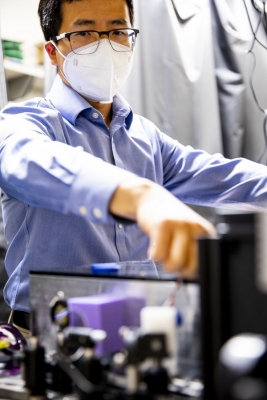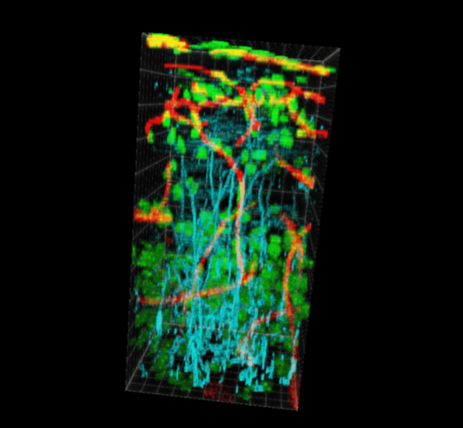We are pleased to announce that Assistant Professors Dan Fu, Cody Schlenker, and Ashleigh Theberge have been promoted to associate professor with tenure, effective September 16, 2022.
Prof. Dan Fu

Professor Dan Fu’s research program focuses on the development of precision chemical and functional measurement tools to study living biological systems and address challenging biomedical problems. Leveraging recent advances in lasers, ultrafast spectroscopy, and optical imaging, the Fu group constructs state-of-the-art multimodal microscopes that enable noninvasive imaging of previously inaccessible essential biomolecules at high spatial and temporal resolution in living cells and living animals. Combining these novel measurements with state-of-the-art machine learning methods, the Fu lab explores the cellular mechanism of many diseases (e.g., cancer, metabolic diseases, neurodegenerative diseases), develops new early disease diagnosis tools, and improves high-content drug screening.
Fu is the co-director of the Master of Science in Applied Chemical Science & Technology program and a member of the UW Biological Physics, Structure & Design program and the Fred Hutchinson/UW Cancer Consortium. His research awards and honors include the Beckman Young Investigator Award, the NSF CAREER Award, the NIH Maximizing Investigators’ Research Award (MIRA), and the Eli Lilly Young Investigator Award.
To learn more about Professor Fu and his research, please visit his faculty page, research group website, or contact him directly.

3D reconstruction of a live mouse brain vasculature, axonal network and distribution of cells. Photo credit: Andrew Francis
Prof. Cody Schlenker

Professor Cody Schlenker’s research group integrates synthetic chemistry, spectroscopy, and device engineering to reveal fundamental principles and advanced materials design concepts with technological relevance. Example targets include low-cost, high-efficiency solar photovoltaics, stable high-capacity rechargeable batteries, and scalable photocatalysts. Their unifying scientific goal is to meet global sustainable energy challenges by more deeply understanding electronic dynamics within heterogeneous solids. His research group focuses on measuring the system response under its native operating conditions using advanced spectroscopic techniques.
Prior to his faculty appointment, Schlenker studied novel semiconducting polymers with Professor David Ginger and life cycle assessment of emerging energy technologies with mechanical engineering professor Joyce Cooper as an NSF Science, Engineering, and Education for Sustainability (SEES) Fellow.
Schlenker is a member of the Clean Energy Institute and Molecular Engineering & Sciences Institute. He is a recipient of the NSF CAREER Award and was named a Journal of the American Chemical Society Young Investigator, an ACS Applied Energy Materials Young Investigator, Washington Research Foundation Innovation Assistant Professor in Chemistry and Clean Energy, and Bernard and Claudine Nist Endowed Faculty Fellow.
To learn more about Professor Schlenker and his research, visit his faculty page, research group website, or contact him directly.

The Schlenker group designs, develops, and evaluates new materials, broadly to relevant energy conversion and storage applications, ranging from photovoltaics to batteries to photocatalysis. The example depicted here shows the photon-driven homolytic cleavage of an O-H bond by a heptazine molecule relevant for understanding the photo-oxidation of water following excitation by two different laser pulses. Photo credit: CW Schlenker
Prof. Ashleigh Theberge

Professor Ashleigh Theberge’s research group, Bioanalytical Chemistry for Medicine and the Environment, studies chemical mechanisms underlying asthma, allergy, infectious diseases, urologic conditions, kidney disease, rheumatic conditions, transgender health, and environmental exposures. They develop analytical chemistry tools to advance medicine, including biomimetic microfluidic systems for integrated cell culture and analysis and at-home sampling tools for diagnostics (blood, saliva) and environmental monitoring. The Theberge group collaborates closely with clinicians to investigate how chemical processes are linked to patient symptoms. A related emerging area of research within the Theberge group centers on developing culture models and molecular isolation tools to study microbial signaling in the environment and agriculture.
Theberge is an adjunct member of the urology faculty in the UW School of Medicine. She holds numerous patents and has received several awards including a Sloan Research Fellowship in Chemistry, Packard Fellowship for Science and Engineering, Beckman Young Investigator Award, NIH Maximizing Investigators’ Research Award (MIRA), and a Kavli Microbiome Ideas Challenge Award grant.
To learn more about Professor Theberge and her research, visit her faculty page, research group website, or contact her directly.